Praful Chandawarkar : INVESTMENT BANKER TO FOODPRENEUR

For the last 25 years, the cheery blue and yellow logo of Malaka Spice restaurant has been representative of fabulous lunches and dinners savoured at a leisurely pace. Lush green surroundings interspersed with an eclectic oriental décor is the highlight of the place. Even as foodies of every hue converge to the upscale restaurant, they are assured of a meal to remember.
And why not? After all, Malaka Spice is a labour of love, research and plenty of legwork, with a menu carefully chosen by founder-director Praful Chandawarkar and his late wife Cheeru, a talented chef and dedicated foodie, travelled extensively across Southeast Asia, bringing back the recipes they loved. Be it Malaysia, Indonesia, Thailand, Singapore, Vietnam, Japan or Cambodia, the duo explored local kitchens in these countries-all the better to curate an experience that was all too new to the Indian market. In true MasterChef style, they gave every dish their own creative twist.
To achieve all this, Praful gave up a successful career as an investment banker to follow his heart’s calling, namely a restaurant all his own. The rewards of following his heart have been many. Not only is he counted amongst the most reputed restaurateurs in the country recognised for his unparalleled contribution to the hospitality industry but Malaka Spice continues to go from strength to strength as foodies vote for it with all their hearts and stomachs, err, we mean souls!
Awarded the ‘Best Restauranteur of the Year’ in 2016, 2019, 2020 by Times Food Awards, Praful has three Malaka Spice restaurants in Pune and one in Nashik.
Corporate Citizen gets up, close and personal with the iconic restaurateur and his many-spendloured, flavourful journey!
After a successful career as an investment banker, the innovative and enterprising Praful chandawarkar shifted his career path to hospitality by opening a Southeast Asian cuisine restaurant which has chains now. Interestingly, his secret to success comes from the legendary ‘Kautilya’s Arthshashtra’, which is all about the science of prosperity. Read on for a deep insight into a gripping personal and professional journey of passion and success
"Post my graduation in 1987, I bagged a plum job with ITC Hotels and worked in their Vadodara hotel. Very soon, in just over five months, I realised that it was not exactly my calling to work for somebody else. There were many reasons for that-I could get lots of business for the hotel, but then I only ended up with a salary"
- Praful Chandwarkar
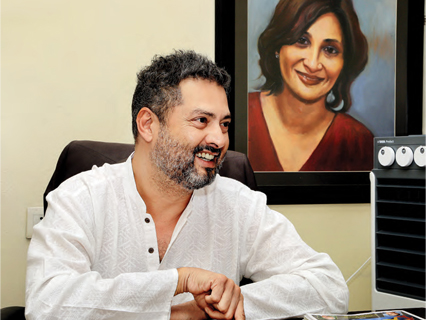
The early years
My father was working for Pfizer as a medical representative and had a travelling and transferable job. I was born in Nagpur but we kept moving from city to city. We came to Pune in 1973, where we’ve been ever since.
I was about five while my brother was older by four years. We were blessed to have mum and dad as our parents because they were involved, creative, imaginative and focused on giving us an excellent foundation. We had the freedom to take up the hobbies and activities we truly enjoyed.
My father was a social person, very popular among family and friends. He liked nature and would grow a lot of vegetables; I inherited the very same green thumb. I am also an agriculturist and work with nature-through a good team, we grow a lot of vegetables and fruits that come to Malaka Spice.
As far as schooling went, I am a product of St.Vincent’s High School, one of the finest schools in Pune and owe much of what I know to its fine grounding in both sports and academics.
After completing my HSC in Science, I took up Hotel Management despite the fact that it wasn’t a very well-known option back then. But I was clear that I did not want to be either a doctor or an engineer. A career in food and hospitality was where my passion lay. And so, in 1984, I took admission into Food Craft Institute (now known as Maharashtra State Institute of Hotel Management and Catering Technology - MSIHMCT). It was a decision that worked well for me because of the personality I had developed as a child. The ability to get along with people, and the love for food came naturally to me.
After three years of a diploma programme in Hotel Management and Catering Technology at Food Craft Institute, I passed out in 1987. My batchmates and I were a hard working and ambitious lot. Our middle-class upbringing and focus instilled in us a desire to achieve. Money was tight and the only way to make it was using our intelligence and hard work. So, right through college, we worked on taking up small assignments. Thus, our entrepreneurial traits were born of necessity. We needed money to spend, and we couldn’t ask our parents-it was enough that father paid for our education. We would take up lots of small-time jobs like catering and event management-we were small entrepreneurs. And we also studied at the night. I also completed a marketing management diploma from the Symbiosis Institute of Business Management (SIBM). We would go to SIBM college at 7:00 pm and then to catering college in the morning but only in my third year.
Working for someone else? Not me, thanks!
Post my graduation in 1987, I bagged a plum job with ITC Hotels and worked in their Vadodara hotel. Very soon, in just over five months, I realised that it was not exactly my calling to work for somebody else. There were many reasons for that-I could get lots of business for the hotel, but then I only ended up with a salary. There were no real incentives and I thought if I work, I should get a larger cut of the pie, but then it is not possible for junior employees, whatever their education or background may be. Luckily for me, I decided then and there that I wouldn’t work for someone.
Buddies, business and taste buddies
I left ITC and joined my friends, Kishor and Kevin, to start a business called “Taste Buddies”. We started doing college festivals and retail fast food products for selling in small shops all over Pune. We had a small kitchen at the edge of a slum in Pune, which also doubled up as Kishor and Kevin’s accommodation. My father didn’t like what I was doing, leaving a big corporate job to work in a small kitchen in a slum area. But we stuck to our guns. In the mornings, we would do our business and in the evenings I would work in a small but very popular restaurant in Pune, called “Ku-Kooch-Ku”. What it did for me was it allowed me to continuously use my mind and observe what other entrepreneurs did. Please note that in the course of the decade between 1988 and 1999, there weren’t too many restaurants in Pune. The owner Mrs Borawake had a very unique system of cost control, product control and cooking good food. Here, I worked for nearly 18 months, from 4 pm to midnight. From 7:30 am to 2:30 pm, I would work for our own enterprise. That was my life, seven days a week, with no breaks.
"Frankly, investment is a jet fighter’s job, very risky and you may win or lose a lot of money. Because I was able to save a lot of money, I could buy my first house, a three-bedroom house, in Pune, before I turned 26"
Moving to Hong Kong: The journey and experience of a lifetime
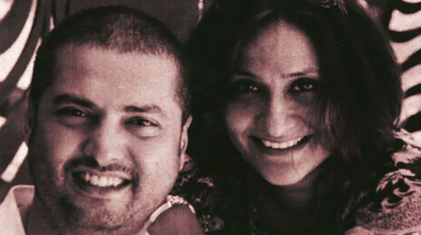 Praful with his late wife Cheeru
Praful with his late wife Cheeru
Later as our business developed well, we decided we would also get into the bakery business. We created a bakery called “Golden Crust” but that didn’t work out well for me. Within a span of three years (1987-1990) we had gone bankrupt as many as four times.
Luckily, for me, my then girlfriend, Cheeru, had started flying for Cathay Pacific Airways and she was also a very hard worker. Those days, flying for airways was a fantastic job because she got to travel the world. Soon, she moved to Hong Kong, and I continued with my business.
When the business wound up, she told me not to waste time and come to Hong Kong. So, I borrowed some money from my cousin and in 1990, I landed up in Hong Kong which was an eye-opener for me in more ways than one. Not only was it my first flight to anywhere, but Hong Kong swept me off my feet. It was developed, sophisticated, beautiful and buzzing. Hong Kong struck me as my soul city. However, the problem was I could not get a job in hotels or restaurants for a long time. The drawback was I could not speak Cantonese, though I made an attempt to learn. I must have gone for over 40 job interviews; nothing seemed to work out. I became so desperate that by the end of it, I started asking for housekeeping jobs also. I remember meeting an American manager at Ritz Carlton Hotel who doubted if I would be able to do housekeeping and rejected me.
A bankable idea at last!
Around this time, one of Cheeru’s friends told me that there was an Indian banker on the lookout for an Indian to join a particular investment bank. I had nothing to lose and decided to give it a shot.
He was dressed in an Armani suit and sitting behind a huge desk. Looking at my CV, the first question he asked me was, “How much do you want to earn?” and threw a calculator at me. I took the calculator, entered one digit followed by as many zeros that could fit and asked him if he would oblige me with the figure? To my shock, he nodded in the affirmative. I was taken aback; the whole interview seemed way too surreal and bizarre. What on earth was going on?
He told me to get suited and reach the office the next day. Curious, I asked if he was really giving me this figure and that also in dollars. His reply was memorable indeed! “You will get the zeros, that one digit will come only when you work”. In short, it was a zero-pay gig but with incentives-just what an entrepreneur does.
I took up the job and then they trained me in Currency Derivatives. There were some incredible trainers from some of the big investment banks, who were doing these cutting-edge derivative products in currency trading. Marketing and sales were natural for me but mathematics, thanks to my St. Vincent’s School education, came natrually to me. They were surprised looking at my comfort with maths and the fact that I could also sell stuff. After a gruelling training session, they made me appear for an examination, for my Securities and Futures Commission license, as you need to be a licensed trader. I got through the exam in the first attempt, and I got a license. That made me a competent person from the point of view of investment banking. I could now recruit people to my team, start calling high net worth individuals, institutions and tell them what I had in mind. In an ironical turn of events, all the people who had earlier interviewed me for a job in Hong Kong were now giving me money to trade for them for currencies.
This was far from easy. Please note, around 1990-91 world was a very scary place, because Berlin Wall had come down and Germany was unified, Tiananmen Square protests had happened, Gorbachev was in danger of his life and Yeltsin was an upcoming leader. Russia was opening up; the Euro currency was in the making-all these events were happening and there was massive volatility in the market. Very much like what is happening today. Also, now things are changing fast in economics all over the world because of the pandemic and the Ukraine-Russia war. So, those were very exciting times for me as I was very young. I was just 25-years-old and was trading currencies and bringing in people. The money was too good and the more we worked, the more money we made. I would sleep six hours and work 18 hours.
Cheeru was flying across the world, so she was not at home most of the time. Saturday and Sunday were off days and I would eagerly wait for Monday when the bank would open again. I hated the weekends and didn’t want to come home.
"I asked my wife-if we migrate to Australia and the Indian cricket team comes to Australia on a cricket tour, will we go to the ground with an Australian flag or the Indian flag? She said, “What a nonsensical question; it can only be the Indian flag”. That settled it: we were going to India!"
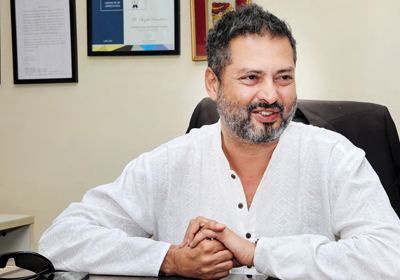
Flying high, fuelled by middle-class values
I started generating a lot of funds and learning about prosperity. While I wasn’t a middle-class boy anymore, the grounding and values were unshakeable. So, I started saving a lot of money-you tend to be more conservative in your spending or as an investor or saver, which was a very good move.
My brother Rahul was then working with ANZ Grindlays Bank, in Chennai. I opened an NRE account in Greenleys and I would save aggressively. Frankly, investment banking is a jet fighter’s job, very risky and you may win or lose a lot of money. Because I was able to save a lot of money, I could buy my first house, a three-bedroom house, in Pune, before I turned 26. I was staying in Hong Kong, and it was just an investment-I had no intention of coming back to India at that time. Cheeru and I continued working in Hong Kong but when the 1997 handover of Hong Kong from the British to the Chinese started coming closer, there was much instability among the Hong Kong population, which continues even today. They have been very brutally brought down-all the protests have been calmed down right now. That was already happening, we could see it under the surface-China was coming in. So, I said there is no point in us sticking on. We were planning to either go to Australia or come back to India. We applied for Australia; in fact, we went and saw a property in Australia. One day, though, I happened to ask a pertinent question to Cheeru that pointed to us where our hearts actually lay. I asked her: If we migrate to Australia and the Indian cricket team comes to Australia on a cricket tour, will we go to the ground with an Australian flag or the Indian flag? She said, “What a nonsensical question; it can only be the Indian flag”. That settled it: we were going to India. She was dumbstruck. I explained that our assimilation into the Australian population would not happen very well if we continued to think of ourselves as Indians. So, if we went to Australia, we had to be prepared to become Australian completely. Cheeru saw my point and we returned to Pune.
Coming to India, I got a good job with a big currency broking house in Mumbai. When I got this well-paying job, Cheeru said that she would stop flying as she had already started getting bored. It was now time to start a family. We have two daughters-my elder daughter, Ilvika who has joined my restaurant business and the younger one,Ilisha is studying to be a chef. When Ilvika was born, I was a banker working in Mumbai. After two years, the investment banking job started boring me. I was turning 30-my mind turned to my old dream once again.
Call of the kitchen: Hospitable times ahead
Cheeru and I sat down and discussed what kind of restaurant we hoped to start. We were young, and had enough savings and it was a good time to take those risks. We decided to go for the cuisine of Southeast Asia. We knew and loved the cuisine well enough. Truth be told, whilst living in Hong Kong, both Cheeru and I would hardly cook Indian food. We would always cook Southeast Asian food. Since we loved it so much, we thought why we don’t make a menu out of it? The first menu that we prepared was only of food we enjoyed in Hong Kong and various countries around it. Then I said, let’s do food from all the countries around the Straits of Malacca (the stretch between the Malay Peninsula and the Indonesian island of Sumatra).
"For Malaka Spice, we chose food recipes, which originated along these Straits of Malacca, wherein the demographic consisted of mixed ancestries from China, Malay, Borneo and India. Cheeru started experimenting with this cuisine and realised that she was a very good chef"
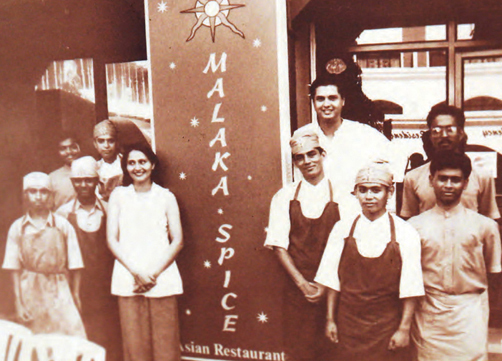 When it all started-Malaka Spice, Pune, 1997
When it all started-Malaka Spice, Pune, 1997
Scripting the Malaka Spice story
The Straits of Malacca, for centuries, was a conduit of the trade from India and China. So, the food was very interesting. Malacca is known as a gateway, and it has a very interesting story. The Sultanate of Malacca was founded in 1402, by Parameswara (1344-1414), a Palembang Prince of Hindu descent from the Srivijaya empire. Parameswara was the last ruler of Singapura who fled to Malacca after armed conflict back at home. In 1409, Parameswara married Malik ul Salih, a princess of Pasai, adopted the Persian title Shah, and styled himself as “Sultan Iskandar Shah,” although he remained a Hindu to his death. Parameswara, brought in a lot of development and trade, so much that even the Chinese emperor invited him to visit China. Thus, we chose food recipes, which originated along these Straits of Malacca, wherein the demographic consisted of mixed ancestries from China, Malay, Borneo and India. Cheeru started experimenting with this cuisine and realised that she was a very good chef. Remember, she had studied hotel management just like me!
We put together a team and called it Malaka Spice. We launched Malaka Spice in July 1997-I had just turned 31. It took some time for people to realise that the food we served was very different-we didn’t get a good response in the beginning because it was so different from what other restaurants were doing. We continued to struggle for about three-four years. But luckily, we stuck to the game and then it became the brand name that people started identifying with the food we served. We started getting celebrities and well-known people. We got an alcohol license and things started improving tremendously. We were at a small location, in Koregaon Park for twelve years from 1997 to 2009. Then in 2009, we moved to a bigger location nearby in Koregaon Park. In 2007, I also started a pub “Post 91” in Koregaon Park, in partnership, which did well for 4-5 years. In 2011, I got out of the partnership and continued to open restaurats of Malacca Spice in Pune and then the franchising stint happened.
Surviving the pandemic, the Arthashastra way
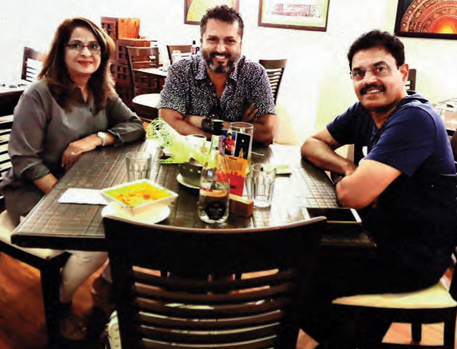 Former Indian Cricket Team Captain Dilip Vengsarkar and
Former Indian Cricket Team Captain Dilip Vengsarkar and Manali Vengsarkar with Praful at Malaka Spice
Luckily for us in the year 2016-17, we shifted our management style from western-style management-which normally all corporates in India follow-to Indian-style management based on the Arthshashtra, which is all about the science of prosperity. This helped us in a way to be very nimble, helped us plan correctly. We actually thrived and innovated a lot. We helped people a lot during the hard lockdown of the Covid pandemic, both in 2020 and 2021. It was an incredibly stressful time but we managed tremendously well because of the science of prosperity, which is the Kautilya’s Arthashastra. Now, two case studies have been written by the Indian School of Business (ISB) in Hyderabad, about how we managed during the Covid pandemic. One is on how Malaka Spice faced the Covid pandemic and how it thrived and innovated. The second case study is about how Malaka Spice is a sustainable restaurant business. Lots of people have started speaking on why it all worked out for us. We even have an educational institution called Chiranjeev Gurukul, a training space for leadership, using Indian wisdom, hospitality, well-being and so on, through Arthshashtra. It is running successfully, and we have percolated it down to our managers as well and to many entrepreneurs in the hospitality business across India.
"The restaurant associations are fighting for ease of doing business. Hopefully, there will be policy changes in the near future. There are thousands of restaurants that employ tens of thousands of people; so as an industry we are bigger than Bollywood"
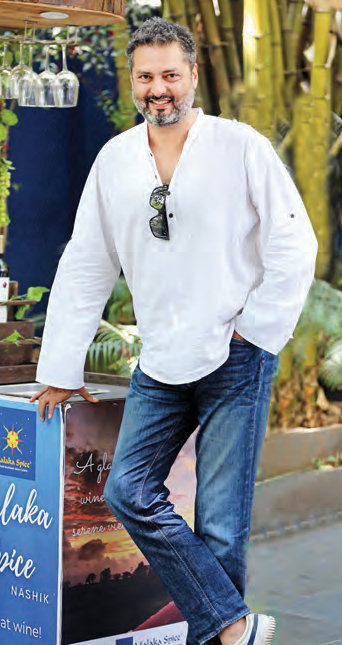
The evolution of dining out over two decades
When we started in 1997; there were very few restaurants in Pune of our quality or even the kind of food we were doing. Driving from Mumbai to Pune took about five hours drive. A massive impetus was the construction of the Expressway which cut back on travel time considerably. Foodies from Mumbai got into their fast cars, came to Pune, ate a meal and drove back.
I have always loved Koregaon Park. Even in the early days while doing the bakery business, we were looking to open next to German Bakery. I liked this primarily because it allowed lots of nationalities to converge into the Osho Ashram. I always thought that was the best part of Pune, for doing hospitality products. Most Punekars in those days would think of Koregaon Park as a foreign land. I did not even think of opening a restaurant elsewhere.
Soon, Pune started developing the IT industry and private educational institutions in a big way. This attracted the youth. Besides Pune’s good climate, attracted people from outside Maharashtra. This influx of people encouraged us, restaurateurs, to try out new things. That tag of Pune as a city for pensioners started changing at the turn of the century around two decades ago. Lots of IT businesses came to Pune to solve the Y2K problem, followed by the dotcom boom and dotcom burst. Thus, Pune became a big IT hub, which gave an opportunity to many new restaurants for sprout and flourish. So, today you get a choice of cuisines in Pune - authentic Chinese, French, Japanese, Italian, Thai, Swiss and many more. Consumer dining preferences have evolved rapidly.
Exposure to professional culinary programmes such as MasterChef Australia has changed how people think about food. This has helped the restaurant business. Cheeru used to take inspiration from Southeast Asia and then use her chef skills to do an inspired recipe. That’s why we say ‘inspired’ Southeast Asian food-it is a chef-run restaurant and still is. This was not acceptable when we started in 1997, now it is as guests respect the chef.
Living up to customer expectations
We just have our own agenda-we are not reactive. I am not interested in making something because someone likes it. I make innovation and I put it out in the market and then the market tells me whether they like it or not. For example, if you like vadapav, I will make a version of vadapav and put it in front of you. If you like it, I am happy, and you are happy. If you reject it, I will innovate again. We have always concentrated on the customer. We have a very well-muscled training department-we have our own philosophy, our own culture. We have a patented programme, which we share with others as well, if they pay us. So, we train all our staff in that patented training programme.
These days, customers have become health conscious-even whilst dining out. Truth be told, for over 25 years we have been farm-to-table, way before it was fashionable, and way before red or brown rice became buzzwords. Long before anyone thought local produce was the way to go, we were the ones cooking with local produce. We never imported paste like other restaurants. In fact, we made our own pastes with ingredients from farms that we were growing in an organic manner, and we are still doing that. We crush that paste ourselves-we even don’t use coconut from a can or a tetra pack. We make fresh coconut milk, every single day, at all our Malaka Spice restaurants. We use cold-pressed oils and not refined oil, in our food. Even the beans sprout that you eat here are grown on my farm-naturally and organically. On some plots of my land, I practice no-till agriculture. All the waste, including green waste, goes to a composter and is then taken to the farm to be used as composted manure. So, we have always been ahead of the times.
The association with Zomato
We have been associated with Zomato from 2010, since they first started. They were then a review platform. It was beautiful, because they helped us, we helped them, we paid them for their reservations. So, they were helping the industry and we were all very happy. Then I started hearing noises in 2015 that they were going to get into home delivery. We were in home delivery since 1997-anywhere in Pune, we delivered our food. Today, Zomato is an `1000 cr company. Of course, they are important for the industry-aggregators like Swiggy and Zomato are very important for restaurants and cloud kitchens. The ease of delivery-all automatic, online and without talking to anybody, the food is delivered. It’s beautiful and they have really taken that technology to a higher level. But they have worked at cross purposes with the people who they are supposed to help, that is restaurants. However, their commissions and marketing costs are so high that small restaurants just cannot survive. It should be a more even playing field. We can’t be the ones who are giving the discounts and the commissions and paying for marketing, and everything.
The restaurant associations are fighting for ease of doing business at the city, state and national levels. Hopefully, there will be policy changes in the near future. There are thousands of restaurants that employ tens of thousands of people; so as an industry we are bigger than Bollywood. Hospitality ranks among the top three in the country for employment and taxation. So, there will be moves to make it a more even playing field. But the growth is coming in the B-class smaller towns.
The expansion into the hinterland, into smaller towns and cities, is going to happen with the big Indian brands. I am opening a second Malaka Spice in Nasik city soon. Soon openings in cities like Indore, Gwalior, Raipur, Thiruvananthapuram and Visakhapatnam, will happen. The towns that are considered no-gos and had only traditional food are now allowing for well-educated professionals to open small restaurants. Zomato and Swiggy are everywhere. The pandemic downturn will soon be history.
"You need to know a lot of things to be a complete restaurateur. If you only want to be a chef and want to run a restaurant, good luck to you. If you say I have the money and I will be the investor and I will get people to work for me, good luck to you. You have to educate yourself in understanding that this business will take your everything"
Artificial Intelligence, Robotics and the future of restauranting
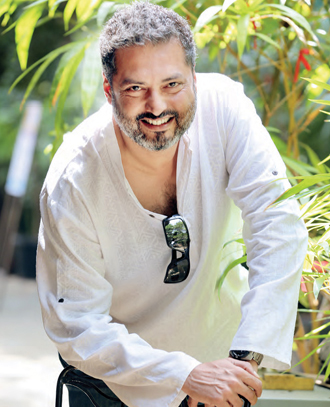
Technology is good for business because people are gradually discovering the sheer comfort of sitting at home, especially during the pandemic, watching a big-screen television with Netflix and having hot food delivered to their doorstep, without talking to a human being. Hi-tech is here to stay. We are also doing AI, robotics, and Customer Relation Management (CRM) programmes which use AI. The concept of Cloud Kitchens is fast catching on. Truth be told, I started cloud kitchens in the year 2016-2017, way before the pandemic, because I was keeping my eyes and ears open to people (who are my friends and kind enough to guide me) who are at present running the biggest internet restaurants in the world-Faasos and Behroz Biryani. The Arthshashtra mentions a concept called Vriddhauposeva. You go to the best in the business and request their mentorship and knowledge. This is a fine way to learn from one another.
‘Educate yourself before you become a foodpreneur’
The restaurant business is a highly skilled business, a non-glamourous business. Don’t come in for the glamour-the glamour is there, but it is not for us, it is for the people from outside to see. In the restaurant business, come for the desire-it’s not even passion, passion can be volatile. You do it because you love the business in a fundamental way.
One tip I would give is get ready for it-it is a capital-intensive business, skill-intensive business and labour-intensive business. It is a factory, and it has all the rules of a factory. So, restaurateurs should be educated not only in the production of a particular product but the legal, statutory clauses and especially the finance. They have to be interested in humans because not only they are your customers, but they are also the people who work for you. So, your human resource management has to be very good. You cannot be scared of hard work because there are long hours. So, you need to know a lot of things to be a complete restaurateur. If you only want to be a chef and want to run a restaurant, good luck to you. If you say I have the money and I will be the investor and I will get people to work for me, good luck to you. You have to educate yourself in understanding that this business will take your everything. You have to be in love with your business, you have to love making food for people, you have to be of service and be kind. So, it is not for everybody. That is why restaurateurs and chefs around the world are respected.